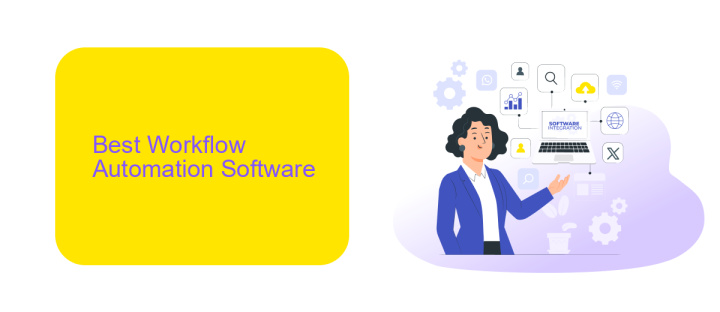Best Workflow Automation Tools
In today's fast-paced business environment, workflow automation tools have become essential for enhancing productivity and efficiency. These tools streamline repetitive tasks, allowing teams to focus on more strategic activities. In this article, we'll explore the best workflow automation tools available, highlighting their features, benefits, and how they can transform your business operations. Discover the perfect solution for your needs.
Introduction
In today's fast-paced business environment, workflow automation tools have become essential for optimizing productivity and efficiency. By automating repetitive tasks and streamlining processes, these tools allow teams to focus on more strategic activities. Whether you are a small business or a large enterprise, finding the right workflow automation tool can significantly impact your operational success.
- Improved efficiency and productivity
- Reduced human error
- Cost savings
- Better task management
- Enhanced collaboration
One notable tool in this space is ApiX-Drive, which excels at setting up integrations between various applications and services. By using ApiX-Drive, businesses can automate data transfers and synchronize information effortlessly, thereby eliminating manual data entry and reducing errors. This makes it easier to maintain a seamless workflow across different platforms, ensuring that your business operations run smoothly and efficiently.
Best Workflow Automation Software

When considering the best workflow automation software, it's crucial to look for tools that can seamlessly integrate with your existing systems and simplify complex processes. Top solutions like Zapier and Integromat offer extensive integration capabilities, enabling businesses to connect various apps and automate tasks effortlessly. These platforms support a wide range of applications, from CRM systems to marketing tools, ensuring that your workflows remain smooth and efficient.
Another noteworthy tool is ApiX-Drive, which excels in setting up integrations and automating workflows without requiring any coding skills. ApiX-Drive enables users to create automated processes between different services and applications, streamlining operations and saving valuable time. By leveraging such advanced tools, businesses can enhance productivity, reduce manual errors, and focus more on strategic activities rather than repetitive tasks.
Types of Workflow Automation Tools

Workflow automation tools are essential for optimizing business processes, reducing manual tasks, and improving efficiency. These tools come in various types, each designed to meet specific needs and functionalities.
- Task Automation Tools: These tools help automate repetitive tasks such as data entry, email responses, and scheduling. Examples include Zapier and Microsoft Power Automate.
- Process Automation Tools: These are more advanced and can handle complex workflows involving multiple steps and departments. Tools like Nintex and Kissflow fall into this category.
- Integration Automation Tools: These tools facilitate seamless integration between different software applications, allowing data to flow smoothly across platforms. ApiX-Drive is a notable example, offering easy integration setup without the need for coding skills.
- Robotic Process Automation (RPA): RPA tools use bots to mimic human actions and automate high-volume, repeatable tasks. UiPath and Automation Anywhere are leading providers in this space.
Choosing the right workflow automation tool depends on your specific business needs and the complexity of the tasks you aim to automate. By leveraging these tools, businesses can significantly enhance productivity and streamline operations.
Benefits of Workflow Automation

Workflow automation streamlines business processes by reducing manual intervention, thereby increasing efficiency and accuracy. By automating repetitive tasks, employees can focus on more strategic activities, ultimately boosting productivity and job satisfaction.
One of the significant advantages of workflow automation is the ability to integrate various software and tools seamlessly. Services like ApiX-Drive facilitate these integrations, allowing different systems to communicate effortlessly, thus ensuring a smooth flow of information across platforms.
- Increased efficiency and productivity
- Reduced human errors
- Seamless software integration
- Enhanced data accuracy and consistency
- Improved employee satisfaction
Overall, implementing workflow automation can lead to substantial time and cost savings for businesses. By leveraging tools and services designed for automation, companies can achieve a higher level of operational excellence, making it easier to scale and adapt to changing market demands.
Conclusion
In conclusion, selecting the right workflow automation tool is crucial for enhancing productivity and streamlining business processes. The tools discussed in this article offer a range of features tailored to different needs, from task management to complex integrations. By carefully evaluating your specific requirements, you can choose a solution that will save time, reduce errors, and ultimately contribute to the success of your organization.
One noteworthy tool for setting up integrations is ApiX-Drive, which simplifies the process of connecting various applications and services. Its user-friendly interface and robust functionality make it an excellent choice for businesses looking to automate workflows without extensive technical expertise. By leveraging tools like ApiX-Drive, companies can ensure seamless data flow and improved operational efficiency, allowing teams to focus on higher-value tasks.
- Automate the work of an online store or landing
- Empower through integration
- Don't spend money on programmers and integrators
- Save time by automating routine tasks
FAQ
What are workflow automation tools?
How do workflow automation tools work?
Why should businesses use workflow automation tools?
Can workflow automation tools integrate with different software applications?
What are some key features to look for in a workflow automation tool?
Apix-Drive will help optimize business processes, save you from a lot of routine tasks and unnecessary costs for automation, attracting additional specialists. Try setting up a free test connection with ApiX-Drive and see for yourself. Now you have to think about where to invest the freed time and money!


